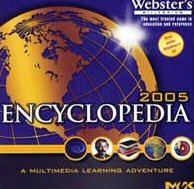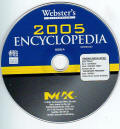Webster's Encyclopedia 2005

Brand New CD
Histories of the United States, the United Kingdom, and Australia are featured, as well as dozens of important American historical documents. Explore the universe with the stargazing guide, prepare slide shows, and much more! Includes CD in sealed sleeve - all instructions on CD.
| Features |
Encyclopedia
A to Z Introduction - This is the main part of Webster's World
Encyclopedia. From here, you can explore thousands of interesting
entries and jump straight to related information in other parts of the
Encyclopedia.
Our World and Beyond
-
World News Day by Day including 1996 to 2004
Major Events Since 1900 - As the 21st century begins, it is interesting to look back at the events that have led up to it. This section summarizes many of the important events since 1900. You can search for an event by name or view all the events chronologically. You can also use the Timelines section to view these major events on a timeline. -
The United Nations - The United Nations section can teach you all about the history of the United Nations and the key dates and major conflicts that have contributed to its development. Take a guided tour of the system and committees that make up this organization and look ahead to see what's in store for it in the future.
-
UNESCO World Heritage Sites - Includes the complete and up-to-date list of every property included in the United Nations World Heritage List. It also includes the criteria for inclusion as a natural or cultural property. Every property is listed by country, including date of inclusion and which criteria each property meets.
-
Launch into Space - Our age-old fascination with the stars and planets has put us on a path of discovery that continues today. Investigate our history in space, from the early Soviet satellites to the Mars Pathfinder Mission and read about upcoming space projects. You can also visit the space photo gallery, which contains over 100 color photographs taken on American and Russian space missions.
-
The Environment - If you are concerned about the environment and want to take action but don't know where to start, this section can guide you. It describes the world's environmental problems and explains what you can do to help solve them. This section includes text from Taking Action, An Environmental Guide For You and Your Community, a United Nations Environment Programme publication.
-
Fast Facts - The Fast Facts section contains hundreds of tables with all sorts of information. Look up a country's past and present political leaders, find out which are the world's ten highest waterfalls, or read about the events of the French Revolution. There are also tables that can tell you the international dialing codes and how to convert feet to meters. If you are looking for facts and figures, this is the best place to start. To help you search quickly, we have now added a hierarchical Fast Facts Index system which should let you zero in. Where necessary, entries appear in more than one place, and there are always jumps to bring you back to the Index, step by step.
-
Countries of the World - Learn all sorts of facts about the countries of the world in the World Atlas section. Each entry contains information about different aspects of the country, such as its climate, population, religion, and natural resources. Select from the Contents below to browse, the Index link at the top of the page for a more detailed browse, or use the Search feature at the top left of screen.
Multimedia Activities
-
Converters - Here you'll be able to convert almost anything, to almost anything.
-
Select the type of conversion you'd like to make from the list below, and away you go. Including length, area, volume, capacity, mass and temperature.
-
Dictionary of Natural History - Select the word and get the meaning of that word.
-
Foreign Phrase Guide - Select the language and then the phrase
-
Jigsaw Puzzles - Unscramble the puzzle. Click on one piece, then another, to swap their positions. Keep going until you've completed the puzzle!
-
MoonGazer - Facts about the moon.
-
StarGazer - Allows you to set the viewing location - select the country and city
-
Time after Time - Discover useful facts on locations
-
Timelines - View various timelines as events have occurred
Poetry
This collection of familiar favorites in verse has been assembled for
two main methods of use. Readers may search for a part-remembered poem
by key words, using our search engine, or they may search for a poet by
going to the The Contents Pages and then to the alphabetical listings of
poets. At the end of each poem, there is a link back to the page listing
verse by that poet, and each of those pages takes you back again the
Contents Pages. There is also extensive cross-referencing within the
poems, leading the reader to explore other poems with the same theme.
For more information on the hows and whys of the collection, see the
Introduction on the next page. As an alternative, you may wish to
explore the poetry and verse by category. To help you, we have created a
set of Poetic themes that you can use. But if you prefer to just browse,
well, you can do that as well. The poets are arranged in chronological
order by year of birth, and then by year of death, placing
contemporaries near each other - you will also find a number of links to
other poems on similar themes.
Science Review
This section gives you the background knowledge you need, and drawing on
the science updates published in Webster's World Encyclopedia, it fills
you in on the latest and best science. The stories are also extensively
cross-linked and cross-referenced. Each year is separated into months
and each month is broken down into different stories, each on its own
page. Read about medical, genetic, weather, technology, space,
evolution, physics, conservation and earth sciences news. This is a
fascinating and absorbing overview for those interested in what is
happening in the scientific world of today. Use the links below to get
started, or go to our handy new tool, The browsing guide for the science
updates, which groups the stories by theme and topic.
Exploring the Past
-
History of the British Isles
-
Historical Anecdotes
-
History of Australia
-
History of Astronomy
-
History of America
-
History of Medicine
-
History Warfare
-
History of Archaeology
-
Modern World History
-
Online Extras
| Requirements |
-
Windows 98, Me, 2000, XP
-
Pentium 200MHz or better
-
12MB of RAM
-
SVGA monitor
-
Sound Card
-
CD-ROM drive
-
Mouse
| Screenshots |



